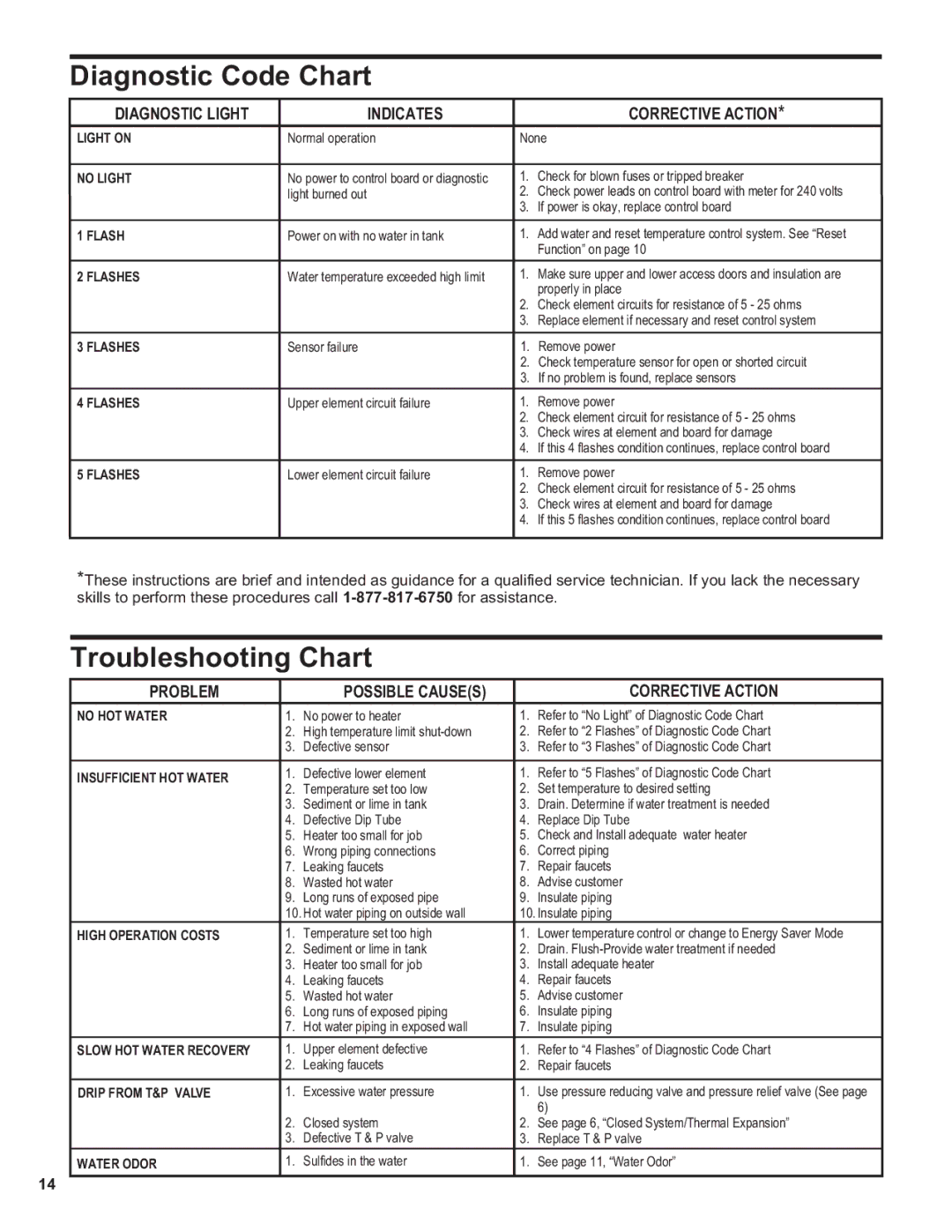
Diagnostic Code Chart
DIAGNOSTIC LIGHT | INDICATES |
LIGHT ON | Normal operation |
NO LIGHT | No power to control board or diagnostic |
| light burned out |
1 FLASH | Power on with no water in tank |
2 FLASHES | Water temperature exceeded high limit |
3 FLASHES | Sensor failure |
4 FLASHES | Upper element circuit failure |
5 FLASHES | Lower element circuit failure |
CORRECTIVE ACTION*
None
1.Check for blown fuses or tripped breaker
2.Check power leads on control board with meter for 240 volts
3.If power is okay, replace control board
1.Add water and reset temperature control system. See “Reset Function” on page 10
1.Make sure upper and lower access doors and insulation are properly in place
2.Check element circuits for resistance of 5 - 25 ohms
3.Replace element if necessary and reset control system
1.Remove power
2.Check temperature sensor for open or shorted circuit
3.If no problem is found, replace sensors
1.Remove power
2.Check element circuit for resistance of 5 - 25 ohms
3.Check wires at element and board for damage
4.If this 4 flashes condition continues, replace control board
1.Remove power
2.Check element circuit for resistance of 5 - 25 ohms
3.Check wires at element and board for damage
4.If this 5 flashes condition continues, replace control board
*These instructions are brief and intended as guidance for a qualified service technician. If you lack the necessary skills to perform these procedures call
Troubleshooting Chart
PROBLEM |
| POSSIBLE CAUSE(S) |
NO HOT WATER | 1. | No power to heater |
| 2. | High temperature limit |
| 3. | Defective sensor |
INSUFFICIENT HOT WATER | 1. | Defective lower element |
| 2. | Temperature set too low |
| 3. | Sediment or lime in tank |
| 4. | Defective Dip Tube |
| 5. | Heater too small for job |
| 6. | Wrong piping connections |
| 7. | Leaking faucets |
| 8. | Wasted hot water |
| 9. | Long runs of exposed pipe |
| 10. Hot water piping on outside wall | |
HIGH OPERATION COSTS | 1. | Temperature set too high |
| 2. | Sediment or lime in tank |
| 3. | Heater too small for job |
| 4. | Leaking faucets |
| 5. | Wasted hot water |
| 6. | Long runs of exposed piping |
| 7. | Hot water piping in exposed wall |
SLOW HOT WATER RECOVERY | 1. | Upper element defective |
| 2. | Leaking faucets |
DRIP FROM T&P VALVE | 1. | Excessive water pressure |
| 2. | Closed system |
| 3. | Defective T & P valve |
WATER ODOR | 1. | Sulfides in the water |
CORRECTIVE ACTION
1.Refer to “No Light” of Diagnostic Code Chart
2.Refer to “2 Flashes” of Diagnostic Code Chart
3.Refer to “3 Flashes” of Diagnostic Code Chart
1.Refer to “5 Flashes” of Diagnostic Code Chart
2.Set temperature to desired setting
3.Drain. Determine if water treatment is needed
4.Replace Dip Tube
5.Check and Install adequate water heater
6.Correct piping
7.Repair faucets
8.Advise customer
9.Insulate piping
10.Insulate piping
1.Lower temperature control or change to Energy Saver Mode
2.Drain.
3.Install adequate heater
4.Repair faucets
5.Advise customer
6.Insulate piping
7.Insulate piping
1.Refer to “4 Flashes” of Diagnostic Code Chart
2.Repair faucets
1.Use pressure reducing valve and pressure relief valve (See page 6)
2.See page 6, “Closed System/Thermal Expansion”
3.Replace T & P valve
1. See page 11, “Water Odor”
14
